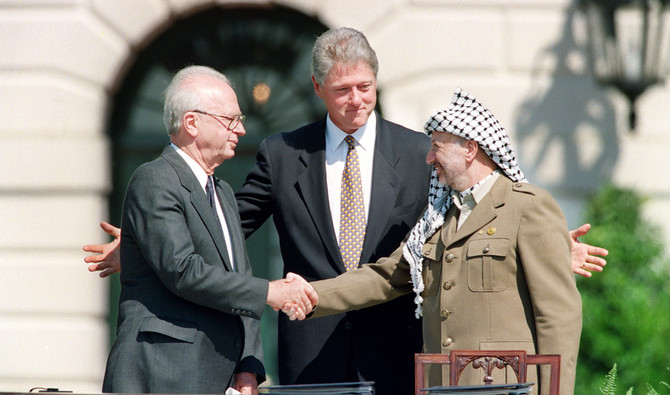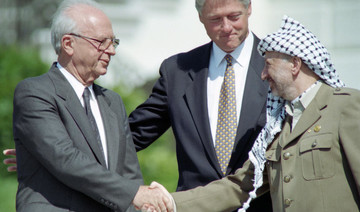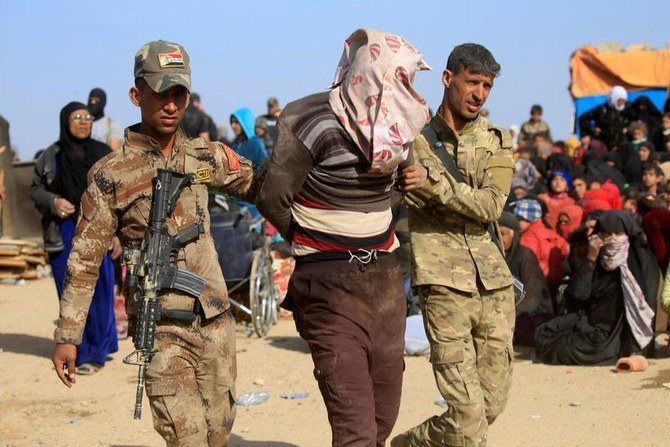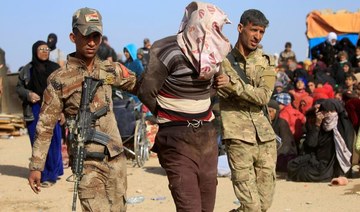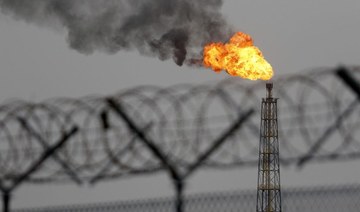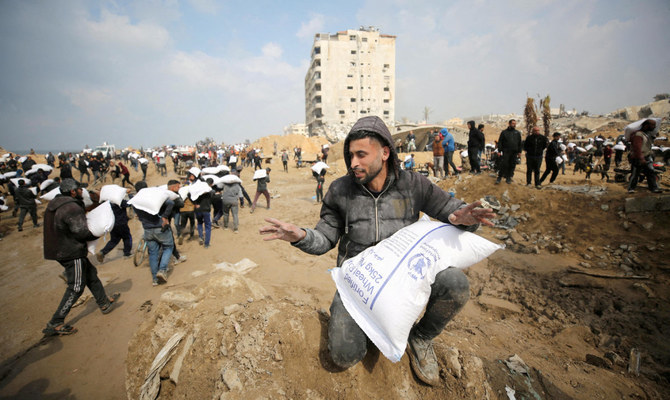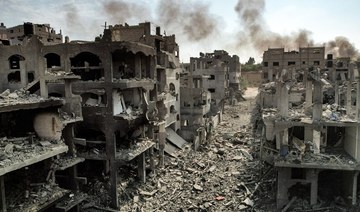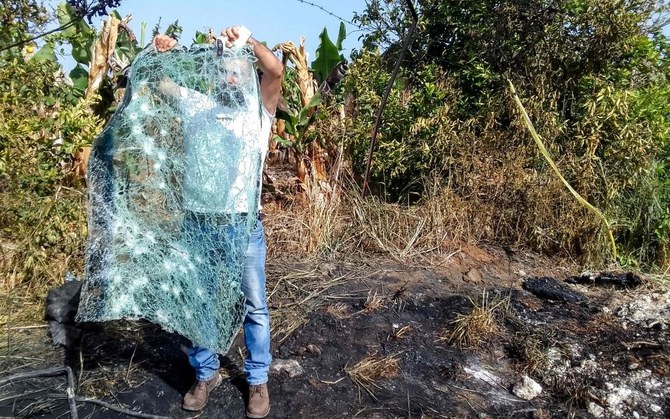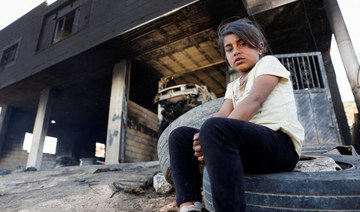AMMAN: When the chairman of the Palestine Liberation Organization, Yasser Arafat, and his deputy, Mahmoud Abbas, stepped foot on US soil in September 1993, the PLO was considered a terrorist organization by the US and Israel.
They had been invited by President Bill Clinton, along with Israeli Prime Minister Yitzhak Rabin and his Foreign Minister Shimon Peres, to sign a memorandum of understanding (MoU) between the PLO and Israel.
First Israel and the PLO exchanged letters of recognition of each other. Once legitimized, the Sept. 13 ceremony at the White House Lawn began. The famous handshake between Arafat and Rabin became the iconic image of the ceremony. The MoU they signed became known as the Oslo Accords.

Yasser Arafat, Shimon Peres and Yitzhak Rabin display their Nobel Peace Prize in Oslo on Dec. 10, 1994. (AFP)
A number of sub-agreements later in Egypt’s Taba, and Wye River in the US, the assassination of Rabin by a religious Jewish Israeli and the collapse of the peace efforts have pushed many to say, as former Palestinian Prime Minister Salam Fayyad wrote in a Foreign Affairs article, that “Oslo is Dead.”
Twenty-five years after that famous handshake, the majority of Palestinians, as well as Israelis and international observers, find it hard to see any worthwhile positives in what had been seen at the time as a major breakthrough.
Hassan Asfour, a senior PLO negotiator who is now editor of an opposition website in Cairo, told Arab News that Oslo did make a major breakthrough that should not be ignored. “This was the first time that Jewish Israeli officials were ever willing to stop the religious expansionism that has become the hallmark of Zionism.”
Asfour, who along with Ahmad Krai (Abu Ala’a), was deeply involved in the secret negotiations with Israel’s Uri Savir and Foreign Minister Shimon Peres, said the breaking of this religious taboo was the main reason for Yitzhak Rabin’s assassination in 1995.
“Rabin was killed by a religious Jew because he dared to give up what Jews consider the heart of their country, what they call Judea and Samaria.” Asfour, who since became negotiations minister and minister of NGOs, resigned in 2005 and has publicly opposed Palestinian President Mahmoud Abbas.
Hamadeh Faraneh, a member of the Palestine National Council in Jordan, said that many forget the achievements of the Oslo Accords. “Oslo wouldn’t have happened had it not been for the popular Palestinian intifada that forced Rabin to partially respond to the national aspirations of the Palestinian people,” Faraneh told Arab News.
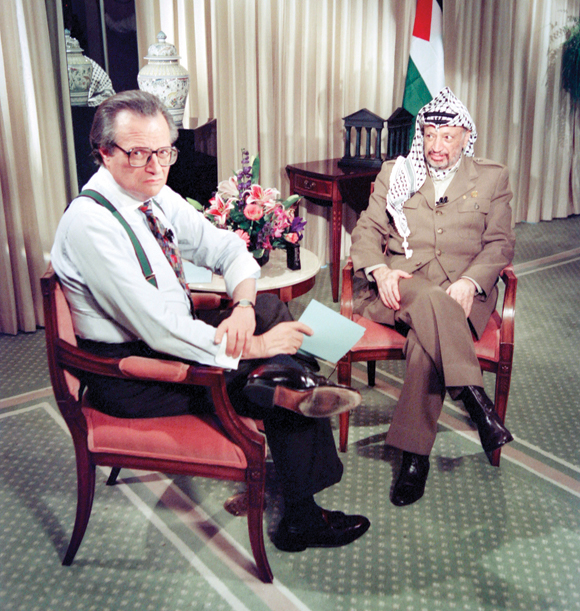
TV interviewer Larry King before beginning his show with Arafat on Sept. 13, 1993 in Washington, D.C. (AFP)
“Oslo witnessed the Israeli and American recognition of the Palestinian people, the PLO and the political rights of Palestinians.”
Faraneh also said that the Oslo Accords led to the partial Israeli withdrawal from Gaza and West Bank cities and the return of 300,000 Palestinians, including top PLO officials and their families. The creation of the Palestinian National Authority was an important step toward the creation of an independent state.
Sam Bahour, an American Palestinian businessman who was among the many who decided to return and invest in Palestine, argues that Oslo exposed Israeli and US hypocrisy over their support for peace and Palestinian statehood. He told Arab News, however, that it has contributed to damaging the geographic integrity of the occupied Palestinian territories, creating divisions without celebrating pluralism.
OPINION
Spirit of Oslo lives on in US’ pro-Israel strategy Ramzy Baroud
Lessons must be learned from fatal flaws in peace process Kerry Boyd Anderson
“Oslo also created a class aligned with the occupation and has further entrenched economic dependency on Israel.” Many cited the division of Palestinian territories to areas A, B and C as one of the biggest concessions Palestinian negotiators made without securing even a freeze of Jewish settlements.
Anees Swedian, head of the PLO’s international affairs department, told Arab News that despite the return of Palestinian leaders and the release of prisoners and withdrawal from populated cities, the negatives have outweighed the positives. “All important issues were temporarily postponed, a five-year period has now turned into decades. Palestinian land is divided, and the Paris Economic Protocol has shackled the Palestinian economy and made it dependant on Israel.”
The assassination of Yitzhak Rabin, followed by the election of right-wing Likud leader Benjamin Netanyahu further complicated issues and impeded progress in the talks. The failure of Camp David II, followed by the second intifada, pushed progress further away and played into the hands of the radicals on both sides. Hamas became more powerful, and after Israel quit Gaza, Hamas took over, leaving the PLO as a minimized entity, and surrounded by settlements and Israeli army checkpoints.
Khaled Abu Arafeh, Palestinian minister for Jerusalem in the short-lived 2006 Ismail Haniyeh’s Hamas government, said that if left alone Hamas could have stopped the Israeli expansionism. “The resistance led by Hamas made the occupation costly and Oslo allowed back a leadership that is not open to real political reform, internal reconciliation or resistance to the occupation,” Abu Arafeh told Arab News.
Ibrahim Johar, a Palestinian writer based in Jerusalem, told Arab News that the major Palestinian error was in trusting the Americans so much. “What we see today ... has exposed the American hypocrisy and has shown that our expectations that the US would stand up for justice and freedom were misplaced.”
Ofer Zalzberg, a senior researcher with International Crisis Group, told Arab News that both sides committed major violations, but even so that in several fundamental ways the Oslo Accords are still very much alive: The existence of the Palestinian Authority, its operations in the Oslo-designated areas A and B, security coordination between Israelis and Palestinians, the customs union and much more all stem from Oslo.
“Seeing that even the (right-wing religious) Jewish Home party’s Naftali Bennett speaks of annexing the Oslo-designated Area C while keeping the current PA-governed reality in areas A and B, and seeing that Hamas is engaged in acquiring influence within the Oslo-made Palestinian Authority rather than seeking to dismantle it, gives room to think the former so far is, perhaps counterintuitively, arguably more likely. For these to occur the PA will have to survive the pressures which the Trump administration employs to implement its coercive diplomacy,” Zalzberg told Arab News.
Hani Al-Masri, a former leftist ideologue with the Popular Front for the Liberation of Palestine, who was able to return to Palestine as a result of the Oslo Accords has set up Masarat, the Palestinian Center for Policy Research and Strategic Studies, in Ramallah. In an analytical piece on Oslo, Al-Masri argued that Palestinians need to work as if there is no Oslo.
“Oslo failed, and it didn’t fail at the same time. It might have been destined to fail from the beginning because it didn’t provide the minimum needed to recognize the rights of the victims. Oslo didn’t fail but was assassinated by successive Israeli governments who refused to take responsibility for their continued crimes.”
Al-Masri added that a new national strategy that gives priority to ending the division and the punishment for Gazans could lead to a new Oslo. “What is needed is a new diverse and pluralistic leadership to be an instrument in the hands of a unified and reformed PLO.”
Hassan Asfour, one of the architects of the Oslo Accords, now editor of news website Amad, had a simpler solution.
“Forget about Oslo, which died in 1996. President Abbas should now go to Gaza and declare the Palestinian state in Gaza, while insisting that the West Bank, including Jerusalem, is an occupied territory that must be turned over to a UN protectorate until it becomes independent.”

Below: The funeral ceremony of Yitzhak Rabin in Jerusalem on Nov. 6, 1995. (Getty Images)


